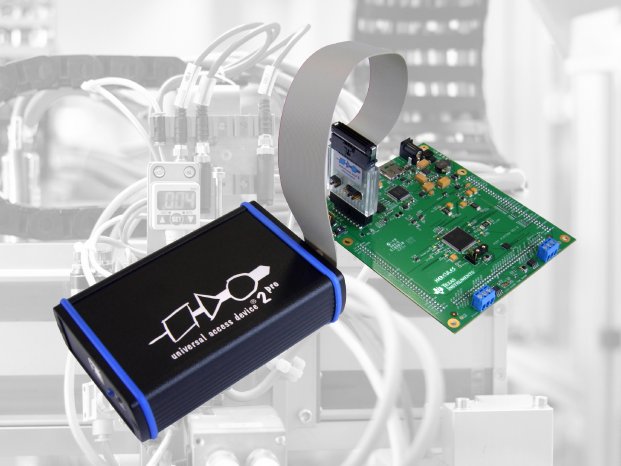The Hercules(TM) TMS570LS and RM4x product families, which are both optimized for applications in the automotive, railway and aviation fields and also for industrial automation and medical and energy technology, not only feature distinctive integrated safety functions but also scalable performance, connectivity and storage options. The core in each case is formed by two ARM® Cortex(TM) R4 CPUs working in lockstep mode, of which the TMS570LS series can be clocked with up to 180 MHz and the RM4x components with up to 220 MHz. Users additionally have up to 3 MByte FLASH, up to 256 KByte RAM, high-performance PWM and timer modules, analog-digital converters and also numerous communication interfaces available depending on the component variant and the target application. The lockstep mode, intelligent memory protection and further safety properties permit compliance with the IEC 61508 SIL-3 and ISO 26262 ASIL-D safety standards with the Hercules(TM) microcontrollers.
Together with the UAD2 and UAD3 Universal Access Devices, UDE 4.0.4 guarantees a fast and stable JTAG connection to the respective Hercules(TM) MCUs and detailed support for the comprehensive on-chip debug resources and peripheral units of the respective product families. Prepared target configurations for the various Hercules(TM) - components guarantee a smooth start to development. The UDE supports all current compilers with DWARF2/3 debug information.
The integrated MemTool permits secure and fast programming of the on-chip memory. For coping with more complex tasks, a program trace is possible with the assistance of the integrated Embedded Trace Macrocell (ETM) and the Universal Access Device 3+ (UAD3+) which can be used not only for classic debugging but also for profiling measurements and code coverage analyses. Target adapters with electrical insulation configured for the application areas of Hercules(TM) MCUs are also available.
Target applications are supported within the UDE software by various graphic display possibilities for the depiction of variables and their links to physical quantities. The debugger can, for example, read and write the entire address space without any limitation on real time behavior whilst the program is running. This permits the periodically updated depiction of variables, registers and memory contents at runtime. The periodic recording of the address counter also permits a statistical profiling function with representation of the percent share of functions in the application's runtime.
"With complex safety-critical automotive, medical technology or industrial applications it is important for developers to be able to get an overview of the current status at any time and if possible in real time. For this reason, we paid special attention to ensuring the simplest possible handling in UDE version 4.0.4 which supports the Texas Instruments Hercules(TM) platform ", explains Heiko Riessland, who is the PLS Product Marketing Manager responsible for the Universal Debug Engine.
"We are pleased that with the Universal Debug Engine 4.0.4. from PLS a further test and debugging solution is available to users as of now which supports the special performance features of the Hercules(TM) safety platform without limitations. Above all, special properties such as the graphic representation of process signals or electrically insulated target connections are a real gain for our tool range", according to Roy Haley from Product Marketing for the Hercules(TM) Safety microcontroller family at Texas Instruments.


